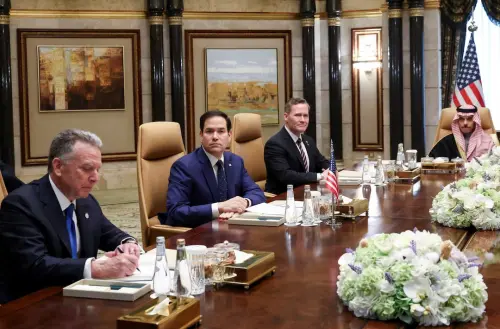The U.S. administration under President Donald Trump announced on Tuesday its willingness to engage in further discussions with Russia regarding the conflict following an initial meeting that did not involve Kyiv. This marked a shift from the previous strategy of rallying U.S. allies to isolate Russian President Vladimir Putin.
During the meeting in Saudi Arabia, which lasted 4-1/2 hours, Russia emphasized its objection to Ukraine becoming a member of the NATO alliance.
Following the talks, Trump expressed increased confidence and hinted at a possible meeting with Putin by the end of the month, stating, "Russia wants to do something." He dismissed Ukraine's absence from the meeting, suggesting that Kyiv should have participated earlier, asserting, "I think I have the power to end this war."
The discussions in Riyadh represented the first direct dialogue between U.S. and Russian officials concerning the conflict in Europe, a situation Ukraine emphasized should not result in decisions being made without its agreement. German Chancellor Olaf Scholz reiterated the necessity of including Ukraine in any decision-making process.
Acknowledging the complexities of the conflict, U.S. National Security Adviser Mike Waltz underlined the importance of negotiations over territorial matters and security guarantees for reaching a lasting resolution.
Both sides acknowledged the need for concessions in achieving peace, with U.S. Secretary of State Marco Rubio affirming Russia's readiness to engage in a robust negotiation process.
Despite the talks, doubts lingered among observers about the feasibility of transforming them into substantive peace negotiations.
Addressing concerns from Ukraine and European leaders, Rubio emphasized the inclusivity of the discussions and the requirement for any resolution to be acceptable to all involved parties.
Ukrainian President postponed a visit to Saudi Arabia to avoid legitimizing the U.S.-Russia talks. Ukraine stressed the importance of not sidelining it in discussions regarding the conflict's resolution.
Russian Foreign Minister rejected the deployment of NATO troops in Ukraine, underscoring that such actions were unacceptable to Moscow.
The negotiations between the U.S. and Russia aim to dismantle economic barriers between the two countries, potentially leading to economic partnerships if the conflict is resolved.
The rapid diplomatic movements, initiated by a recent Putin-Trump phone call, raised alarms in Ukraine and Europe over the possibility of a deal disregarding their security concerns and rewarding Moscow for its actions.
In Washington, concerns were voiced about excluding Ukraine and NATO from bilateral diplomacy, with fears that Russia may leverage the situation to threaten Ukraine and other nations in the future.
